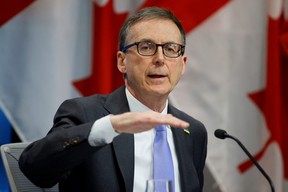Food prices in grocery stores rose at the fastest pace since August 1981, while gas prices fell

OTTAWA — Canadian Inflation Finally Peaked It looks like it, but it's still too expensive to deter the Bank of Canada from taking more interest. says the economist.
July year-on-year inflation slowed to 7.6 percent, Statistics Canada reported Tuesday. Rent and travel continued to rise.
Economists pointed to June's nearly 40-year high of 8.1%, which had been rising every month since June 2020, as the high-water mark for overall inflation.{33
In further indication that price gains are slowing, officials said July's month-on-month rise was the smallest since December 2021.
Still, inflation The rate is well above the Bank of Canada's target of 2%. said it was "still too high" and emphasized the central bank's role in keeping inflation down.
Mr. Macklem understands that rising interest rates are exacerbating economic hardships for Canadians, but the best way to curb the rising cost of living is to borrow money. He said it would raise costs.

Down long term. This will ultimately be better for everyone because high inflation hurts us all.It robs us of our purchasing power and makes it difficult to plan our spending and savings,” he said. Macklem said.
Recommended Video
The Bank of Canada hopes the series of rate hikes will be sufficient to contain economic demand and slow the pace of inflation.
"Rising interest rates and inflation are needed to slow people's spending patterns, but they're not happening to that extent," said TD Chief Economist Beata Karranci. said consumer spending rose at a faster pace in the first half of the year in Canada than in the United States.
The central bank has paid more attention to core inflation indicators, which have been less volatile than the main figures and relatively unchanged since June, Karranchi said. .
Economists widely expect the Bank of Canada to raise its key rate by three-quarters of a percentage point on her Sept. 7.
Whatever the central bank plans, University of Calgary economics professor Trevor Tombe says the latest inflation data are unlikely to change plans, suggesting interest rate decisions and the economy
"Based solely on what we see in this report, they intend to speed up or slow down their plans." No," Tombe said. "It's important to remember: Monetary policy takes a long time to get through (the economy)." The report reflects the latest inflation data for the United States, with July inflation falling to 8.5% from 9.1% the previous month — and largely due to lower prices at the pump.
Americans are still absorbing greater price increases than in decades, including higher prices for food, rental housing and health care.
In Canada, 7 Gas prices rose 35.6% year-on-year in May, down from a staggering 54.6% rise in June. Still, Canadians are feeling the pinch of inflation. Food costs rose 9.9% year-on-year, the fastest pace since August 1981.
Tu Nguyen, an economist at accounting and consulting firm RSM Canada, said: Inflation being 'rife' across the economy means there is still a long way to go before the pressure on Canadians' finances is significantly eased.
“It will take some time before families can breathe a sigh of relief. Wage growth continues to lag inflation, resulting in households losing purchasing power. ,” Nguyen said in a note.
His average hourly wage in July rose 5.2% compared to a year ago.
According to Statistics Canada, rising price pressures are due to continued concerns related to the global economic slowdown, his COVID-19-related public health restrictions in China, This is due to a combination of factors, including an increase in demand and a slowdown in demand. American gasoline.
Among food items that surged, bakery products rose 13.6% from last year as input costs rose as Russia's invasion of Ukraine continued to put upward pressure on wheat prices. ing. Other food prices also rose faster, including eggs, which rose 15.8% from last year, and fresh fruit, which rose 11.7%.
Rents are rising faster in July than the previous month, according to the report, as mortgage costs rise as interest rates rise.
Airfares rose about 25% in July compared to the previous month as more Canadians traveled during the peak summer season. Traveler accommodation prices rose nearly 50% from a year ago, the largest increase in Ontario.
Canadian province July inflation rate
(previous month in brackets)
— Newfoundland and Labrador: 6.9 % (8.2)
— Prince Edward Island: 9.5% (10.9)
— Nova Scotia: 8.7% (9.3)
— New Brunswick: 8.0% (9.1)
— Quebec: 7.3% (8.0)
— Ontario: 7.6% (7.9)
— Manitoba: 8.8% (9.4)
— Saskatchewan: 8.1% (8.1)
— Alberta: 7.4% (8.4)
— British Columbia: 8.0% (7.9)
July Inflation Rates for Selected Canadian Cities
(previous month in brackets)
— St. John's, N.L.: 6.5% (7.5)
— Charlottetown-Summerside: 9.9% (11.5)
— Halifax: 8.6% (9.1)
— St. John, New Jersey: 7.9% (9.0)
— Quebec City: 6.7% (7.4)
— Montreal: 7.3% (7.6)
— Ottawa: 7.4% (7.7)
— Toronto: 7.5% (7.4)
— Thunder Bay, Ontario: 6.0% (6.6)
— Winnipeg: 8.6% (9.4)
— Regina: 8.2% ( 8.1)
— Saskatoon: 7.4% (7.6) {1 63}
— Edmonton: 7.6% (8.5)
— Calgary: 8.2% (9.6)
— Vancouver: 7.7% (7.7)
— Victoria: 8.2% (8.4)
— Whitehorse: 7.7% (7.7)
— Yellowknife: 8.0 percent (8.3)
— Iqaluit: 5.2 percent (4.3)

Noon, the latest headlines, articles, opinions and photos from the Toronto Sun.
Thank you for registering.
Sending welcome email. If you don't see it, please check your spam folder.
The next issue of Your Midday Sun will arrive in your mailbox shortly.


